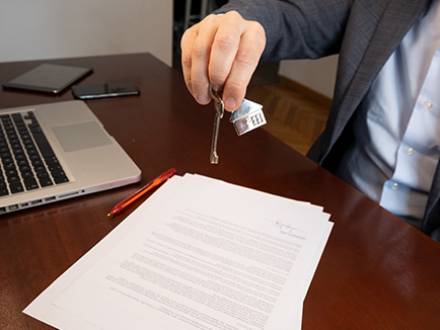Recent Blog Posts
The Different Types of Deeds In Virginia and Characteristics of Each: A Comprehensive Guide
 Today, we're going to delve into the world of real estate deeds in the Commonwealth of Virginia. A deed, in its simplest form, is a legal document that transfers ownership of real estate from one party to another. However, not all deeds are created equal. In Virginia, there are several types of deeds, each with its own unique characteristics and uses. Let's explore them together.
Today, we're going to delve into the world of real estate deeds in the Commonwealth of Virginia. A deed, in its simplest form, is a legal document that transfers ownership of real estate from one party to another. However, not all deeds are created equal. In Virginia, there are several types of deeds, each with its own unique characteristics and uses. Let's explore them together.
1. General Warranty Deed
The General Warranty Deed is the gold standard of deeds. It provides the highest level of protection for the buyer because the seller guarantees that they own the property free and clear of any liens or encumbrances. This guarantee extends back to the property's origins, regardless of the property's history.
Typically, when property is sold by a Seller to a Buyer, a deed is drafted granting title to the Buyer. The General Warranty Deed and Special Warranty Deed are deeds which contain warranties/covenants which protect the Buyer
With this deed, the legal title to the property is transferred to the Buyer. The deed also provides assurance that the Seller is the lawful owner of the property and that the title to the property is marketable, meaning that there are no liens that would prevent the transfer of the property. The deed will include six covenants of title (warranties) representing the Seller's promises to the buyer. Three of these covenants are known as "present covenants," and they will apply to the Seller. The other three covenants are known as "future covenants," and they allow the Buyer to take enforcement actions against any of the property's previous owners if these covenants are breached.
Can You Use A Power of Attorney in a Real Estate Closing? What You Should Know
 It is not unusual for a party to a real estate transaction to be unavailable to personally execute the voluminous number of documents required at closing. In some cases, the signatory is out of the State or Country, in others the signatory may be hospitalized or otherwise not competent to personally execute a conveyance or purchase of property. In each of these, a power of attorney ("POA") may be used to allow another person to execute for the principal. However, there are important issues to understand which may impact the ability for a POA to be used.
It is not unusual for a party to a real estate transaction to be unavailable to personally execute the voluminous number of documents required at closing. In some cases, the signatory is out of the State or Country, in others the signatory may be hospitalized or otherwise not competent to personally execute a conveyance or purchase of property. In each of these, a power of attorney ("POA") may be used to allow another person to execute for the principal. However, there are important issues to understand which may impact the ability for a POA to be used.
Types of POAs
There are two forms of POAs that are seen in a real estate transaction, a General Durable POA and Specific POA.
General Durable Power of Attorney
The General Durable POA allows the agent to execute and act for the principal in virtually all instances in which the principal could act. This is usually created in the context of planning one’s estate or in the event the principal fears that some event will occur that will cause him or her to be disabled or injured to the extent they would not be able to act. It includes the word "Durable" because it states that the POA will continue to be in effect even if the principal is disabled or not otherwise competent to act.
Issues To Consider Before Leasing Commercial Property In Virginia
 On behalf of Faisal Moghul of Fox & Moghul posted in a blog on Friday, January 10, 2020.
On behalf of Faisal Moghul of Fox & Moghul posted in a blog on Friday, January 10, 2020.
The purpose of this article is to give interested parties an overview of the commercial leasing process. This memorandum is not intended to establish an attorney client relationship and the information provided herein is strictly for informational purposes only.
When preparing to acquire a commercial property, either by lease or purchase, the principal of "caveat emptor" should be at the forefront of our minds. This is because the many protections often afforded by statutes or common law to the purchaser of a home are absent from a commercial transaction.
Remember that the structure of a commercial lease is very different from an ordinary residential lease. Assuming that you have conducted a diligent market analysis and selected the right location for your business, here are the next steps that you must follow before executing your commercial lease.
Earnest Money Deposit (EMD) Disputes and NVAR Real Estate Purchase and Sale Contracts
 Our firm often gets calls regarding EMD disputes in real estate transactions. An earnest money deposit (EMD) is an amount of money that is deposited by a buyer and held in an escrow account to ensure compliance with the terms of the Real Estate Contract. The amount of the deposit is negotiated between the buyer and seller at the time the contract is signed, with input from your agent. The EMD is held by the escrow agent, named in the contract. The real estate broker or the settlement agent can act as your escrow agent.
Our firm often gets calls regarding EMD disputes in real estate transactions. An earnest money deposit (EMD) is an amount of money that is deposited by a buyer and held in an escrow account to ensure compliance with the terms of the Real Estate Contract. The amount of the deposit is negotiated between the buyer and seller at the time the contract is signed, with input from your agent. The EMD is held by the escrow agent, named in the contract. The real estate broker or the settlement agent can act as your escrow agent.
The Escrow Agent
The escrow agent is charged with holding the EMD until the closing. This amount is then credited to the buyer on the Closing Disclosure (the CD). In the event there is a dispute between the buyer and seller or if the closing does not occur, the escrow agent will continue to hold these funds until a Release of Deposit is executed by both parties (buyer and seller).
The signed Release details which party is to receive the EMD and specific disbursements to each party, if it is to be divided. The escrow agent cannot disburse the EMD without a signed Release. In the event the parties cannot agree on how to disburse the EMD, the escrow agent has the option of paying that amount into the court. In that event, the parties must petition the court to have it disbursed. This will cause each party to incur court and legal fees. The escrow agent has the right to subtract any fees they incur in the event they pay the EMD into the court. That will reduce the amount available for disbursement to both the buyer and seller. It is most advantageous for everyone to agree on a disbursement and prevent a court action. In the event of a dispute over an EMD, Fox & Moghul can help resolve this issue.
What Can I Do If I Own a Property With My Girlfriend or Ex-Wife, and We Have Broken Up?
 This is a very common question pertaining to the relative rights between unmarried couples who co-own property. In other words, home ownership among nonmarried couples. Typically, a couple decide to buy real estate together and the deed lists both of them as co-owners of the property.
This is a very common question pertaining to the relative rights between unmarried couples who co-own property. In other words, home ownership among nonmarried couples. Typically, a couple decide to buy real estate together and the deed lists both of them as co-owners of the property.
Soon, things go south and the parties start fighting over whatever property they shared or owned. In this case, the issue of which party or parties are signatories to the mortgage is also important in determining what the relative rights of the parties are in this scenario. If you are on title to a property with your ex-significant other ("Ex"), you hold title as either tenants in common or joint tenants with rights of survivorship. If the time has come to separate oneself from such joint ownership, the law affords a statute that can be used to achieve that end (Va. Code § 8.01-81 to § 8.01-93).
In the event a co-owner wants to extract himself from title, a partition can be accomplished in one of three ways. However, a fourth option exists, defined below.
How to Transfer Title of Property From Myself to LLC: Deed, Title, and Other Key Considerations
 When it comes time to contribute personally owned real estate into your LLC, there are key legal steps and practical considerations that must be followed to ensure a proper transfer of title and risk management for both the individual and the LLC. The process involves more than simply recording a deed—it must be done in a manner that protects your interests and complies with lender requirements, lease obligations, and title insurance coverage.
When it comes time to contribute personally owned real estate into your LLC, there are key legal steps and practical considerations that must be followed to ensure a proper transfer of title and risk management for both the individual and the LLC. The process involves more than simply recording a deed—it must be done in a manner that protects your interests and complies with lender requirements, lease obligations, and title insurance coverage.
Form the LLC and Obtain an EIN
Before you can transfer title to your LLC, you must properly form the LLC with the Virginia State Corporation Commission and obtain an Employer Identification Number (EIN) from the IRS. This establishes the LLC as a legal entity capable of holding title to real estate.
Draft and Record Deed of Gift
A Deed of Gift is commonly used when contributing property to an LLC without receiving payment. This deed must clearly identify the grantor (you) and grantee (your LLC), with proper legal descriptions of the property. The deed must be executed, notarized, and recorded in the land records of the county or city where the property is located.
My Contractor Damaged My Property During A Remodelling Project, Is Unlicensed, And Does Not Have Insurance – What Can I Do?
 Our office is often contacted by homeowners whose property has been damaged by a contractor during a home remodeling project. What’s worse is that the contractor is discovered not to have a license, as required by Virginia law, so filing a complaint with the Virginia Department of Professional and Occupational Regulation (DPOR) would serve no good. So what are your options as a homeowner in Virginia?
Our office is often contacted by homeowners whose property has been damaged by a contractor during a home remodeling project. What’s worse is that the contractor is discovered not to have a license, as required by Virginia law, so filing a complaint with the Virginia Department of Professional and Occupational Regulation (DPOR) would serve no good. So what are your options as a homeowner in Virginia?
Definition of A "Contractor" Under Virginia Code 54.1-1100:
Virginia Code § 54.1-1100 defines a "Contractor" very broadly as follows:
A "contractor" may be any person who bids on or accepts contracts or orders to perform or manage construction, repairs, improvement, or removal of a building or structure for a fixed price, fee, percentage, or commission. The "improvements" performed by a contractor may include cleanup, remediation, or containment of contaminants on a premises or other work performed to ensure that real estate property will be usable and can be occupied by humans according to the guidelines established in § 32.1-11.7.
The Virginia Residential Property Disclosure Act (VA CODE 55.1-700 ET SEQ) – What Real Estate Buyers Should Know
 The Virginia Residential Property Disclosure act is a statutory scheme enacted by the General Assembly of Virginia that requires a seller of real estate in Virginia to "furnish to a purchaser a residential property disclosure statement for the buyer to beware of certain matters that may affect the buyer's decision to purchase such real property" Va Code 55.1-703. The act essentially codifies the caveat emptor standard under Virginia law regarding matters within the scope of its disclosure.
The Virginia Residential Property Disclosure act is a statutory scheme enacted by the General Assembly of Virginia that requires a seller of real estate in Virginia to "furnish to a purchaser a residential property disclosure statement for the buyer to beware of certain matters that may affect the buyer's decision to purchase such real property" Va Code 55.1-703. The act essentially codifies the caveat emptor standard under Virginia law regarding matters within the scope of its disclosure.
This article will discuss the respective rights and remedies of buyers and sellers with respect to issues related to the VRPDA.
Applicability of the Virginia Residential Property Disclosure Act.
Under Va. Code § 55.1-701, the VRDPA applies to any transaction related to the "transfers by sale, exchange, installment land sales contract, or lease with option to buy of residential real property consisting of not less than one nor more than four dwelling units, whether or not the transaction is with the assistance of a licensed real estate broker or salesperson." In other words, the VRDPA applies to sales, or leases with an option to buy, of residential real estate, regardless of whether a real estate broker is used.
The Sources of Duty Rule: A Critical Analysis for Construction and Business Litigation
 In the complex field of construction and business litigation, understanding the principles that govern liability is essential. One such principle is the "Source of Duty" rule, a key concept in Virginia law that plays a pivotal role in determining whether a claim should be pursued as a tort or as a breach of contract. This blog will explore the Source of Duty rule in depth, referencing key cases and applying this rule to common scenarios encountered in construction disputes. For the attorneys at Fox & Moghul, based in Fairfax, VA, specializing in real estate and business litigation, a thorough understanding of this rule is crucial to securing favorable outcomes for their clients.
In the complex field of construction and business litigation, understanding the principles that govern liability is essential. One such principle is the "Source of Duty" rule, a key concept in Virginia law that plays a pivotal role in determining whether a claim should be pursued as a tort or as a breach of contract. This blog will explore the Source of Duty rule in depth, referencing key cases and applying this rule to common scenarios encountered in construction disputes. For the attorneys at Fox & Moghul, based in Fairfax, VA, specializing in real estate and business litigation, a thorough understanding of this rule is crucial to securing favorable outcomes for their clients.
What is the Source of Duty Rule?
The Source of Duty rule helps determine whether a claim in construction litigation should be classified as a tort or a breach of contract. The distinction is critical because the remedies available in tort and contract law differ significantly, impacting the litigation strategy. Essentially, the rule states that if the duty breached arises solely from the contractual agreement, the claim must be pursued as a breach of contract. Conversely, if the duty exists independently of the contract, the claim may be actionable in tort.
Understanding the Economic Loss Rule and Privity of Contract in Virginia Construction Law
 In the intricate realm of Virginia construction law, the concepts of privity of contract and the economic loss rule play pivotal roles in determining the recourse for economic losses incurred due to negligence. This legal framework establishes a boundary between tort and contract law, specifying the conditions under which economic damages can be pursued. Through an exploration of case law and statutes, this blog provided by our highly sought after litigation attorneys at Fox & Moghul sheds light on how these principles are applied in Virginia, particularly in the context of construction disputes.
In the intricate realm of Virginia construction law, the concepts of privity of contract and the economic loss rule play pivotal roles in determining the recourse for economic losses incurred due to negligence. This legal framework establishes a boundary between tort and contract law, specifying the conditions under which economic damages can be pursued. Through an exploration of case law and statutes, this blog provided by our highly sought after litigation attorneys at Fox & Moghul sheds light on how these principles are applied in Virginia, particularly in the context of construction disputes.
Privity of Contract and Economic Loss Rule: A Legal Overview
Virginia law stipulates that for one to recover economic losses in a negligence action, there must be privity of contract between the parties involved. This requirement underscores a fundamental distinction between tort law — which safeguards against harm to persons and property — and contract law, which protects the expectations negotiated between parties.








